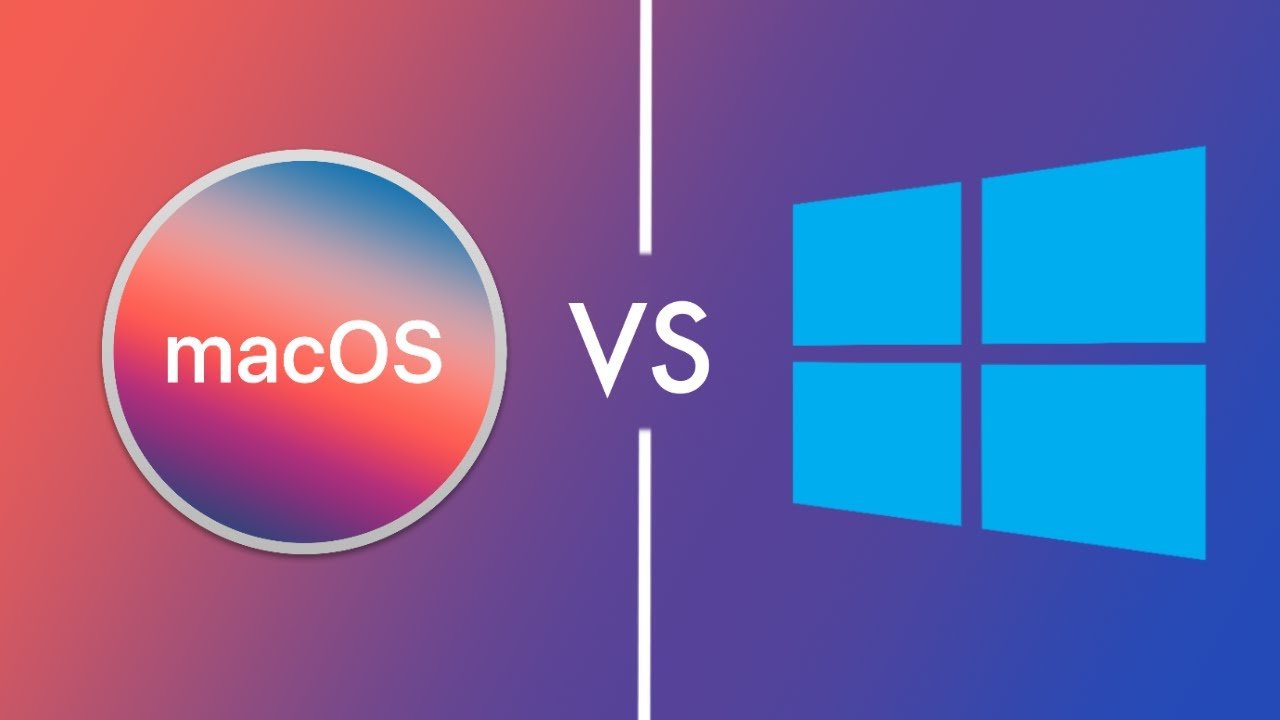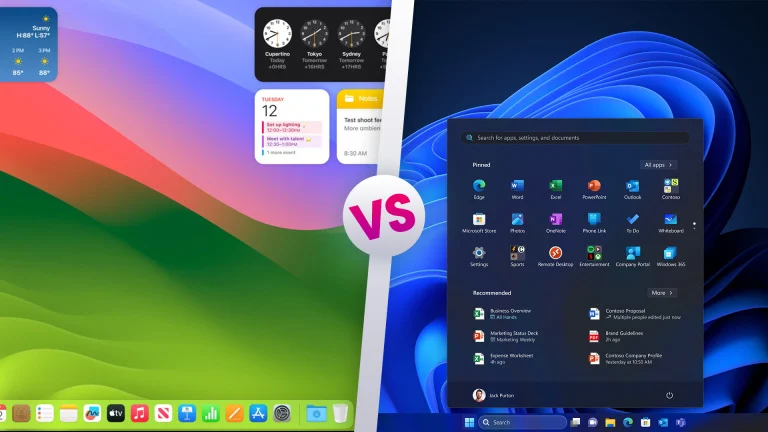Choosing between Windows and macOS depends on various factors, including personal preferences, specific needs, and use cases. Both operating systems offer unique features and advantages. Here’s a comparative overview to help you determine which might be better suited for you.

User Interface and Experience
Windows
- Customization: Windows provides extensive customization options for the user interface, allowing users to adjust the look and feel according to their preferences.
- Start Menu: The Start Menu in Windows offers easy access to applications, settings, and files, with customizable tiles and shortcuts.
- Taskbar: The taskbar is highly configurable, supporting pinning of apps and quick access to system functions.
macOS
- Design Aesthetic: macOS is known for its sleek, minimalist design and smooth animations, creating a visually appealing and cohesive experience.
- Dock: The Dock provides quick access to frequently used applications and can be easily customized.
- Finder: macOS’s Finder offers a streamlined way to navigate files and folders, with features like tags and Quick Look for previewing documents.
Software and Compatibility
Windows
- Software Library: Windows boasts a vast library of software applications, including a wide range of professional and consumer programs.
- Gaming: Windows is the dominant platform for gaming, with broad support for a wide range of games and gaming technologies.
- Business Applications: Many business and enterprise applications are designed for Windows, making it a popular choice in corporate environments.
macOS
- Creative Applications: macOS is renowned for its support of creative applications like Adobe Creative Cloud and Final Cut Pro, making it a preferred choice for designers and video editors.
- Integration: macOS integrates seamlessly with other Apple products, including iPhones, iPads, and Apple Watches, providing a cohesive ecosystem for users.
- Software Availability: While macOS has a strong selection of applications, some specialized or industry-specific software may be limited compared to Windows.
Performance and Stability
Windows
- Hardware Compatibility: Windows supports a wide range of hardware configurations, from high-end gaming PCs to budget systems.
- Performance: Performance can vary based on hardware and system configuration, with frequent updates aimed at improving stability and efficiency.
macOS
- Optimization: macOS is optimized for Apple hardware, leading to a stable and efficient performance experience. Apple’s tight integration between hardware and software often results in smoother performance.
- Updates: macOS updates are generally less frequent but are well-tested and designed to enhance security and performance without disrupting the user experience.
Security and Privacy
Windows
- Security Features: Windows includes built-in security features such as Windows Defender, BitLocker, and frequent security updates.
- Vulnerability: Due to its wide user base, Windows is a more frequent target for malware and cyber-attacks, requiring additional security measures.
macOS
- Security Focus: macOS is known for its strong security measures, including Gatekeeper, which ensures only trusted software runs on the system, and FileVault for full-disk encryption.
- Less Targeted: macOS is less frequently targeted by malware compared to Windows, partly due to its smaller user base and built-in security features.
Cost and Accessibility
Windows
- Hardware Options: Windows can be installed on a broad range of hardware, from budget PCs to high-end gaming rigs, providing flexibility in terms of cost.
- Licensing: Windows requires purchasing a license, which may come pre-installed on many PCs or be purchased separately.
macOS
- Apple Hardware Requirement: macOS is only available on Apple devices, which tend to be more expensive compared to non-Apple hardware options.
- Cost of Entry: While macOS itself does not have an additional cost beyond the hardware, Apple devices generally come at a premium price.
Support and Ecosystem
Windows
- Support: Windows has extensive support resources, including forums, official documentation, and customer service.
- Ecosystem: Windows integrates with a wide range of third-party hardware and software, providing flexibility and extensive compatibility.
macOS
- Support: Apple offers robust customer support, including Genius Bar appointments and online assistance.
- Ecosystem: macOS benefits from seamless integration with Apple’s ecosystem, including iCloud, Apple Music, and other services.
Conclusion
Choosing between Windows and macOS largely depends on your specific needs and preferences. If you value extensive software compatibility, customization, and a wide range of hardware options, Windows may be the better choice. On the other hand, if you prioritize a cohesive user experience, strong creative software support, and tight integration with Apple’s ecosystem, macOS might be the ideal fit.
Consider what aspects are most important for your use case, whether it’s performance, software availability, security, or overall user experience, to make an informed decision.
